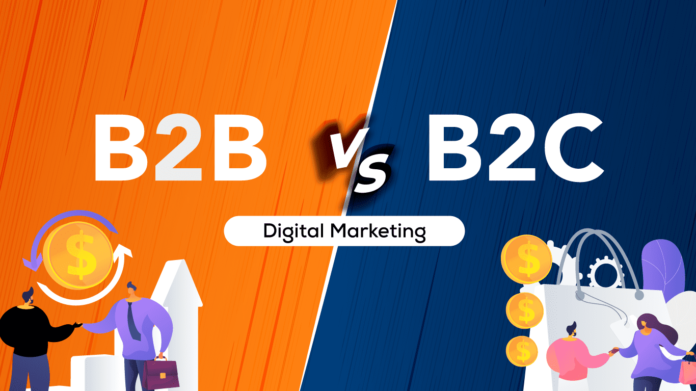7 Key Differences Between B2B and B2C Digital Marketing
Digital marketing isn’t a one-size-fits-all approach. The strategies that work for a business targeting other businesses (B2B) differ significantly from those aimed at consumers (B2C). Understanding these differences is crucial for crafting effective campaigns that resonate with the right audience. Let’s explore the key distinctions between B2B and B2C digital marketing and the strategies that drive success in each segment.
1. Audience and Buying Behavior
In B2B marketing, the target audience is typically professionals, decision-makers, and purchasing committees. These buyers are looking for solutions that improve efficiency, reduce costs, or enhance productivity. The decision-making process is often complex, involving multiple stakeholders and longer sales cycles.
On the other hand, B2C marketing targets individual consumers who make purchasing decisions based on personal needs, emotions, and immediate benefits. The buying journey is usually shorter, and impulse buying is more common in B2C than in B2B.
2. Content Strategy: Informational vs. Emotional
B2B digital marketing focuses on educational and data-driven content. Whitepapers, case studies, industry reports, and in-depth blog posts help build trust and authority. The goal is to demonstrate expertise and provide valuable insights that aid decision-making.
B2C marketing, however, relies on emotional appeal and storytelling. Video content, social media campaigns, and user-generated content play a significant role in creating a personal connection with the audience. The messaging is often direct, entertaining, and engaging.
3. Marketing Channels and Platforms
B2B marketers prioritize LinkedIn, email marketing, and content marketing to establish thought leadership and nurture leads. Webinars, industry conferences, and SEO-optimized blogs are essential tools in a B2B strategy.
B2C marketers, on the other hand, thrive on social media platforms like Instagram, Facebook, and TikTok, where visual and interactive content captures attention. Influencer marketing and paid social media ads play a crucial role in reaching a broad audience quickly.
4. Lead Generation and Conversion Strategies
Lead generation in B2B marketing involves nurturing potential clients through multiple touchpoints, often requiring personalized email campaigns, detailed product demos, and retargeting strategies. The goal is to build long-term relationships and encourage repeat business.
In contrast, B2C marketers aim for quick conversions. Flash sales, discount codes, and one-click purchasing options enhance the customer experience and drive immediate sales. Retargeting ads and email reminders are effective in recovering abandoned carts.
5. Sales Cycle Length
The B2B sales cycle is significantly longer, often spanning weeks or months. This extended timeline necessitates consistent follow-ups, in-depth consultations, and multi-step nurturing campaigns to close deals.
B2C transactions, however, are typically completed within minutes to days. Marketers focus on optimizing the customer journey, ensuring smooth navigation, seamless checkout processes, and immediate gratification.
6. SEO and Keyword Strategy
SEO is vital for both B2B and B2C digital marketing, but the approach differs. B2B marketers target industry-specific keywords with lower search volumes but higher conversion potential. Long-form content, expert interviews, and in-depth analysis help improve search rankings.
B2C marketers, however, rely on high-volume, transactional keywords. Their SEO strategy focuses on product descriptions, local SEO, and optimizing for voice search to capture consumers looking for quick solutions.
7. Email Marketing Tactics
Email marketing in B2B focuses on relationship-building through personalized content, newsletters, and in-depth guides. Drip campaigns nurture leads through multiple touchpoints before conversion.
B2C email marketing is designed for direct engagement, using visually appealing emails, product recommendations, and limited-time offers to drive immediate action.
Winning Strategies for B2B vs. B2C Digital Marketing
For businesses to succeed in the digital landscape, understanding and implementing the right marketing strategies is essential. Here are key tactics for each model:
B2B Digital Marketing Strategies
- Leverage LinkedIn Marketing: Engage with professionals through targeted ads, company updates, and industry discussions.
- Create High-Value Content: Whitepapers, webinars, and long-form blog posts establish credibility and attract decision-makers.
- Invest in Account-Based Marketing (ABM): Tailored campaigns for high-value clients enhance engagement and conversions.
- Utilize Marketing Automation: Email sequences, lead scoring, and CRM tools streamline nurturing processes.
- Optimize for Thought Leadership: Publishing expert articles, guest posts, and case studies helps position the brand as an industry leader.
B2C Digital Marketing Strategies
- Use Social Media Ads Effectively: Leverage Facebook, Instagram, and TikTok ads to reach targeted demographics.
- Prioritize Visual and Video Content: Engaging videos, influencer collaborations, and interactive content drive engagement.
- Implement Personalization: AI-driven product recommendations and personalized email campaigns increase customer loyalty.
- Focus on Mobile Optimization: Ensuring a seamless mobile experience improves conversion rates.
- Leverage FOMO (Fear of Missing Out): Flash sales, limited-time offers, and exclusive deals encourage quick purchases.
Bridging the Gap: Learning Digital Marketing Strategies
Whether targeting businesses or consumers, mastering digital marketing techniques is crucial for success. Enrolling in an online digital marketing course can help marketers stay ahead of industry trends, learn effective strategies, and refine their approach to B2B and B2C marketing.
Conclusion
B2B and B2C digital marketing require distinct approaches tailored to their respective audiences, sales cycles, and engagement methods. While B2B marketing thrives on trust, expertise, and long-term relationships, B2C marketing capitalizes on emotion, entertainment, and instant gratification. By understanding these differences and leveraging the right strategies, businesses can optimize their digital marketing efforts and achieve sustained success.



